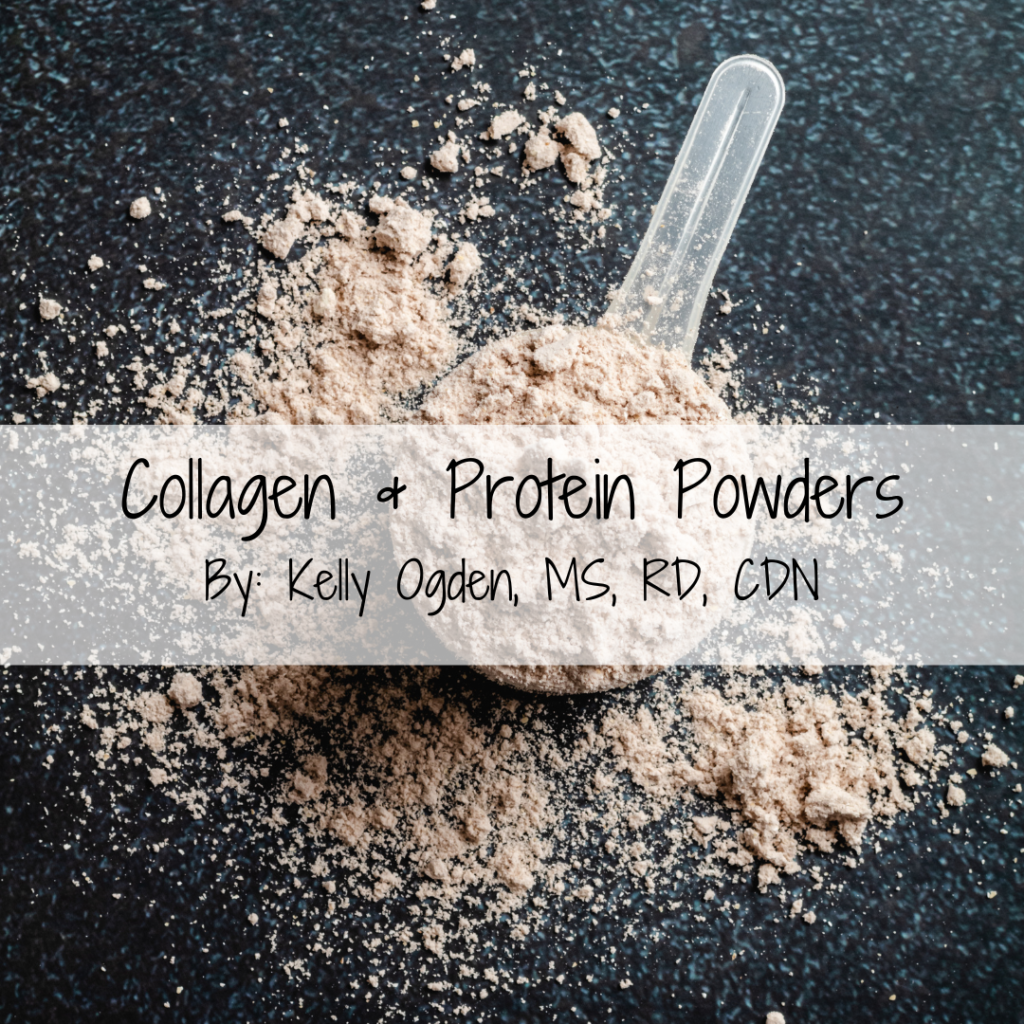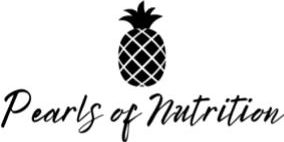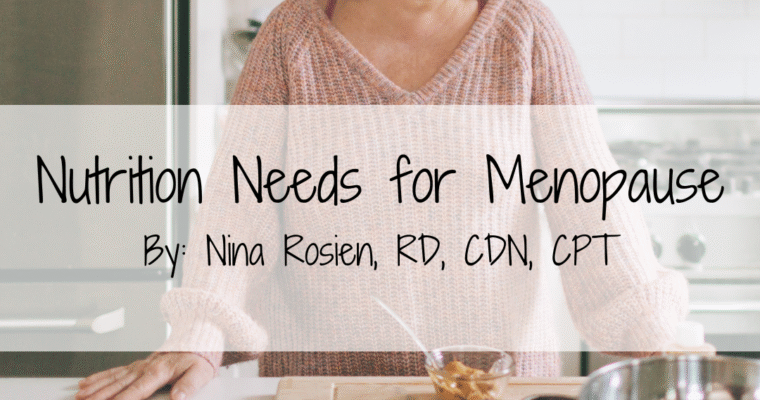
If you’re on social media you have probably seen at least one post or influencer talking about their newest protein powder or collagen supplement. Protein is one of the three macronutrients that our body needs daily and most of us know it for its aid in muscle growth. So do you actually need these powders and supplements? What even are they? Before we get into that, here is your reminder that nutrition is individual and your needs depend on your own goals and preferences. What works for one person may not be appropriate for another. Consider this information in the context of your own personal physical needs and relationship with food. When in doubt, check in with your Registered Dietitian to see if using protein powders or collagen is appropriate for you.
Collagen
Collagen is a protein that plays a crucial role in the body. It is a major structural protein that is found in skin, hair, nails, tendons, cartilage, and bones. Collagen works with other substances to maintain skin elasticity, volume, and moisture. It also helps make up proteins such as keratin that form skin, hair, and nails. Collagen powder is considered an incomplete protein because it doesn’t contain all of the amino acids (the building blocks of protein) that our body needs. Complete proteins are protein sources that contain all 9 essential amino acids. Collagen only contains 8 out of the 9 essential amino acids; it misses the amino acid tryptophan. It does, however, contain approximately 33% glycine, an amino acid required in large quantities for collagen production.
Our bodies naturally produce collagen using the amino acids from protein-rich or collagen-rich foods. As collagen is naturally produced in our body, supplementation is not 100% necessary though can be helpful due to the high glycine content. As an alternative, we can also learn how to incorporate it through specific foods in our diets. Several high-protein foods are believed to enhance collagen production because they contain critical amino acids for collagen production: glycine, proline, and hydroxyproline. These foods include fish, poultry, pork, beef, eggs, dairy, legumes, and soy. Leaving the skin on things like chicken and fish can also enhance your intake of collagen. Collagen production also requires nutrients like zinc (found in shellfish, legumes, meats, nuts, dark chocolate, and whole grains) and vitamin C (found in citrus fruits, berries, bell peppers, and tomatoes). The body cannot make its own vitamin C so it’s crucial to obtain this nutrient from the diet. Over time, things like aging, sun damage, smoking, chronic stress, lack of exercise, and alcohol consumption all decrease collagen production.
Collagen drinks and supplements often contain collagen from many different sources, such as fish, cattle, pigs, or chicken. They may be sold as collagen peptides or hydrolyzed collagen, which are broken down forms of collagen that are more easily absorbed. Collagen supplements contain amino acids and some may also contain additional nutrients related to healthy skin and hair like vitamin C, biotin, or zinc. These additional nutrients also help the synthesis of collagen.
If you are not consuming adequate energy throughout the day, this is more important to adjust before thinking about starting supplementation of collagen or any other supplement. If your body is being deprived of calories and adequate macronutrients it may not have the ability to make adequate collagen through the required amino acids. If you feel like you are adequately consuming calories and protein throughout the day then there are no studies that prove it is harmful to supplement with collagen. If you choose to supplement, I would recommend looking for a brand that does third party testing which should be indicated on the bottle. Third party testing is important since supplements are not regulated like food and medications are so it’s up to the manufacturers to let individuals know what their products contain.
Protein Powders
Protein powder can come from a variety of animal sources like dairy-based whey or casein protein powders, collagen powder as discussed above, and different types of plant-based protein including soy, hemp, rice, or pea. Whey and casein are two different proteins found in cow’s milk and are both considered complete proteins (they contain all 9 essential amino acids!). The main difference between the two is that casein digests slower than whey meaning it takes your body longer to break it down into amino acids. Whey is often used in post-workout protein shakes because it digests quicker and is more readily available for the body to use sooner. Similar to collagen, plant-based protein powders are considered incomplete proteins, however, as long as you’re eating a diverse diet, it most likely is not an issue.
On protein powder containers you may see the words ‘isolate’ or ‘concentrate’. An isolate indicates the protein powder went through additional processing to increase protein content and eliminate any carbohydrate or fat sources. Ideally, an isolate will digest and absorb faster than a concentrate, but both are equal in terms of protein quality. A concentrate typically contains less protein by weight and has more carbohydrates and fat.
Research shows boosting protein may help increase strength and lean body mass which is beneficial especially as we age. Unless you have a restricted diet or follow a strict plant-based or vegan regimen, this is often still achievable through your daily food intake. How much protein an individual needs varies based on their age, training style, goals and any health conditions. The minimum amount recommended for most humans to prevent deficiency is 0.8 grams of protein per kilogram of bodyweight each day. Getting enough to prevent deficiency and the optimal amount for you can be two very different things. You will likely benefit from having a higher dose than the bare minimum. You can work with your Registered Dietitian to find out what that looks like for you.
You don’t need protein powders, but you do need protein so if you are someone who struggles to get adequate protein then powders could be a helpful tool. Both protein powders and collagen powders can be added to smoothies, baked goods, energy balls, oat or yogurt bowls, soups, beverages, and other meals to offer a protein boost. Cost will vary depending on the brand and ingredients. See the recipe below for baking with protein powder and a balanced, on-the-go snack! And here is a bonus pumpkin oat ball recipe we like! Perfect for the fall.
Peanut Butter Oat Balls
Ingredients:
- 1 cup quick cook oats
- 2 TBSP flax or chia seeds
- 2 TBSP mini chocolate chips
- 1/4 cup collagen peptides or protein powder
- 1/4 cup + 2 TBSP peanut butter (or other nut butter)
- 2 TBSP maple syrup
Instructions:
- Add oats, seeds, and chocolate chips, and collagen to a medium mixing bowl and stir well.
- In another bowl, mix the peanut butter and maple syrup.
- Add the wet ingredients to the oat mixture and mix well.
- Refrigerator for at least 30 minutes.
- Form the mixture into balls slightly smaller than golf ball size.
- Serve right away or store in an airtight container in the refrigerator, up to one week. Can be frozen for up to 6 months.
Resources:
https://www.hsph.harvard.edu/nutritionsource/collagen/
https://blog.nasm.org/do-you-need-to-take-protein-powder
https://kellyjonesnutrition.com/pumpkin-energy-balls/
https://reillybeatty.com/collagen-and-protein-powder-which-one-should-you-take/


